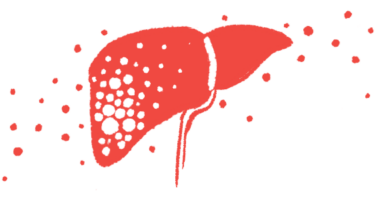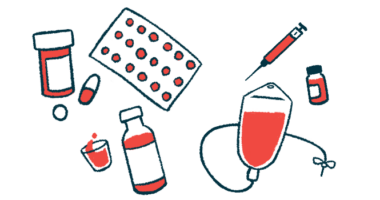Finally: A Comeback From CAD is Possible

People diagnosed with the rare autoimmune hemolytic anemia Cold Agglutinin Disease (CAD) have had to face the symptoms of ongoing hemolysis, including the associated symptom and impact of fatigue, without a treatment to address the underlying cause— until now.
WHAT HAPPENS IN CAD
CAD is a rare disease in which the immune system mistakenly attacks and destroys red blood cells—the cells that carry oxygen throughout the body. When these blood cells are destroyed (in a process called hemolysis) faster than they are made, you may experience other symptoms, including fatigue, weakness, shortness of breath, light-headedness, chest pain, and irregular heartbeat. These symptoms can present in unpredictable ways and may get worse if you have a weakened immune system, an infection, or are exposed to cold temperatures. Some people with CAD may have felt or been advised by their physician that their best strategy would be to avoid the cold temperatures that trigger worsening symptoms—but CAD may destroy red blood cells regardless of whether you avoid cold temperatures or not. However, there’s a treatment that selectively targets the underlying cause of hemolysis in CAD. Whether you have received blood transfusions in the past or not, people living with CAD now have another option: ENJAYMO (sutimlimab-jome). (Discuss with your doctor if ENJAYMO may be appropriate for you.)
THE IMPACT OF ENJAYMO
ENJAYMO, a breakthrough treatment from Sanofi, is a prescription medicine used to treat the symptoms of ongoing hemolysis in adults living with CAD. A placebo-controlled clinical study in 42 patients with CAD assessed how well ENJAYMO worked and how safe and tolerable it is for people living with CAD. People living with CAD with no history of blood transfusion in the last 6 months were split into two groups: one given ENJAYMO and one given a placebo, neither of which knowing which of the two options they were given. In this study:
- 73% of patients given ENJAYMO had increases in hemoglobin (the protein in red blood cells that carries oxygen) levels of at least 1.5 g/dL (compared to 15% of participants on placebo)
- 82% of patients given ENJAYMO avoided the need for transfusions (compared to 80% of participants on placebo)
- 86% of patients given ENJAYMO had no additional treatment for CAD beyond what was permitted in the study (compared to 100% of participants on placebo)
So not only did ENJAYMO work to help stop the destruction of red blood cells whether patients had a recent blood transfusion or not, it also meant patients didn’t need other treatments or to undergo transfusions as frequently.
People living with CAD may report an inability to undertake activities and hobbies that they previously enjoyed—like gardening or going on walks. In this study, patients were also asked to respond to a 13-item questionnaire regarding their level of fatigue on a scale of 0 to 4 (52 total points)—from not at all impacted to very much so impacted. Overall, patients with CAD who had not recently required a blood transfusion reported an average of an 11-point improvement in their score when taking ENJAYMO. Patients taking placebo, meanwhile, reported on average a 2-point improvement.
The safety of ENJAYMO was studied in two clinical studies. The most common side effects of ENJAYMO include: increase in blood pressure, urinary tract infection, respiratory tract infection, bacterial infection, swelling in lower legs or hands, joint pain, headache, nausea, runny nose, bluish color to the lips and skin, dizziness, feeling tired or weak, cough, changes in color or sensation in the fingers and toes (Raynaud’s phenomenon). These are not all the possible side effects of ENJAYMO. Call your doctor for medical advice about side effects.
ENJAYMO is given as an intravenous (IV) infusion weekly for the first 2 weeks, and then every 2 weeks after that.
To learn more about the way ENJAYMO could help you on your comeback from CAD, visit ENJAYMO.com. There you’ll find additional information, resources, and helpful tools to support you on your journey with CAD. If your life has been affected by hemolysis and the impact of fatigue in CAD, ask your doctor for more information.
INDICATION
ENJAYMO® is a prescription medicine used to treat the breakdown of red blood cells (hemolysis) in adults with cold agglutinin disease (CAD).
It is not known if ENJAYMO is safe and effective in children.
IMPORTANT SAFETY INFORMATION
Do not receive ENJAYMO if you are allergic to sutimlimab-jome or any of the ingredients in ENJAYMO.
ENJAYMO can cause serious side effects, including:
- Serious Infections: ENJAYMO is a prescription medicine that affects your immune system. ENJAYMO may lower the ability of your immune system to fight infections. ENJAYMO increases your chance of getting serious infections including those caused by encapsulated bacteria, including Neisseria meningitidis, Streptococcus pneumoniae, and Haemophilus influenzae type B. These serious infections may quickly become life-threatening or cause death if not recognized and treated early.
- You must complete or be up to date with the vaccines against Streptococcus pneumoniae and Neisseria meningitidis at least 2 weeks before your first dose of ENJAYMO.
- If your healthcare provider decides that urgent treatment with ENJAYMO is needed, you should receive vaccinations as soon as possible.
- If you have been vaccinated against these bacteria in the past, you might need additional vaccines before starting ENJAYMO. Your healthcare provider will decide if you need additional vaccines.
- Vaccines do not prevent all infections caused by encapsulated bacteria. Call your healthcare provider or get emergency medical care right away if you get any of these signs and symptoms of a serious infection:
-
-
- fever with or without shivers or chills
- fever with chest pain and cough
- fever with high heart rate
- headache and fever
- confusion
- clammy skin
- fever and a rash
- fever with breathlessness or fast breathing
- headache with nausea or vomiting
- headache with stiff neck or stiff back
- body aches with flu-like symptoms
- eyes sensitive to light
-
- Infusion-related reactions: Treatment with ENJAYMO may cause infusion-related reactions, including allergic reactions that may be serious or life-threatening. Your healthcare provider may slow down or stop your ENJAYMO infusion if you have an infusion-related reaction and will treat your symptoms if needed. Tell your healthcare provider right away if you develop symptoms during your ENJAYMO infusion that may mean you are having an infusion-related reaction, including:
- shortness of breath
- decrease in blood pressure
- chest discomfort
- rapid heartbeat
- nausea
- injection site reaction
- flushing
- headache
- dizziness
- rash
- itchy skin
- Risk of autoimmune disease: ENJAYMO may increase your risk for developing an autoimmune disease such as systemic lupus erythematosus (SLE). Tell your healthcare provider and get medical help if you develop any symptoms of SLE, including:
- joint pain or swelling
- rash on the cheeks and nose
- unexplained fever
- If you have CAD and you stop receiving ENJAYMO, your healthcare provider should monitor you closely for the return of your symptoms after you stop ENJAYMO. Stopping ENJAYMO may cause the breakdown of your red blood cells due to CAD return. Symptoms or problems that can happen due to red blood cell breakdown include:
- Tiredness
- shortness of breath
- rapid heart rate
- blood in your urine or dark urine
- The most common side effects of ENJAYMO include:
- increase in blood pressure
- urinary tract infection
- respiratory tract infection
- bacterial infection
- swelling in lower legs or hands
- joint pain
- headache
- nausea
- runny nose
- bluish color to the lips and skin
- dizziness
- feeling tired or weak
- cough
- changes in color or sensation in the fingers and toes (Raynaud’s phenomenon)
These are not all the possible side effects of ENJAYMO. Call your doctor for medical advice about side effects.
Before receiving ENJAYMO, tell your healthcare provider about all of your medical conditions, including if you:
- have a fever or infection, including a history of human immunodeficiency virus (HIV), hepatitis B, or hepatitis C.
- have an autoimmune disease such as systemic lupus erythematosus (SLE), also known as lupus.
- are pregnant or plan to become pregnant. It is not known if ENJAYMO will harm your unborn baby.
- are breastfeeding or plan to breastfeed. It is not known if ENJAYMO passes into your breast milk.
Tell your healthcare provider about all the medicines you take, including prescription and over-the-counter medicines, vitamins, and herbal supplements.
Know the medicines you take. Keep a list of them to show your healthcare provider and pharmacist when you get a new medicine.
Please see Full Prescribing Information, including Medication Guide.
©2024 Sanofi. All rights reserved. ENJAYMO and Sanofi are registered trademarks of Sanofi or an affiliate. MAT-US-2406205-v1.0-07/2024







